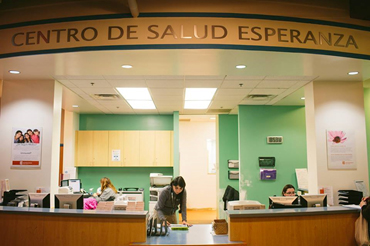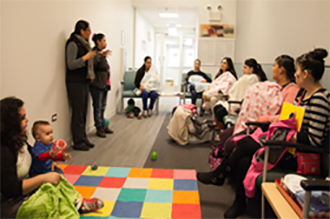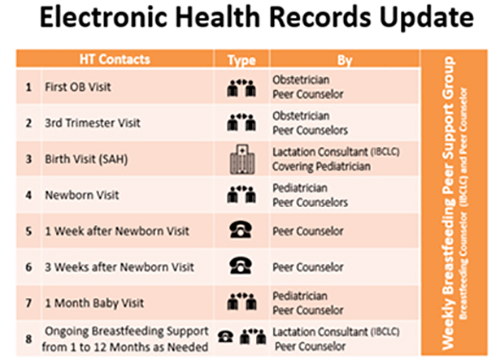 By Carmen Vergara, RN, MPH (ESPERANZA HEALTH CENTERS) and Harumi Reis-Reilly, MS, CNS, CHES, IBCLC (NACCHO)
By Carmen Vergara, RN, MPH (ESPERANZA HEALTH CENTERS) and Harumi Reis-Reilly, MS, CNS, CHES, IBCLC (NACCHO)
Esperanza Health Centers, a former grantee of NACCHO’s Breastfeeding Initiative, is a Federally Qualified Health Center (FQHC) on the Southwest side of Chicago. The main population served is predominately low-income and Latino, and families in Esperanza’s service area experience significant economic, educational, and health inequities. Over 70% of area residents live 200% below the poverty level. Esperanza’s main services are adult primary care, pediatrics, prenatal care, and behavioral health. Additional public health services include programs related to children’s weight management, diabetes management, and physical activity.
Healthy Tomorrows Program (HTP)
 In 2013, the HTP was launched with funds from Health Resources and Services Administration (HRSA). The program has been endorsed by the Department of Public Health in Chicago, owing to its potential to reduce inequities by providing access to high-quality culturally appropriate care. The program is designed to improve breastfeeding rates among Latinas, who typically initiate breastfeeding, but have lower rates of duration and higher rates of formula supplementation.
In 2013, the HTP was launched with funds from Health Resources and Services Administration (HRSA). The program has been endorsed by the Department of Public Health in Chicago, owing to its potential to reduce inequities by providing access to high-quality culturally appropriate care. The program is designed to improve breastfeeding rates among Latinas, who typically initiate breastfeeding, but have lower rates of duration and higher rates of formula supplementation.
Beyond providing culturally appropriate breastfeeding education and support, the HTP seeks to address client social service needs and remove barriers to care access by helping Latinas navigate the U.S. healthcare system, as well as insurance issues, to ensure that they receive comprehensive prenatal and postpartum care. The HTP aligns the medical specialties, including, but not limited to, OB/GYNs and pediatricians, and frontline staff within the FQHC to work together to increase breastfeeding rates.
In 2015, with funds from the National Association of County and City Health Officials (NACCHO) and the Centers for Disease Control and Prevention (CDC) and other sources, Esperanza expanded the HTP by implementing weekly breastfeeding peer support groups in a highly visible public area at one of its three clinic locations, and partnered with a local library branch to host offsite support groups within the broader community. Esperanza went beyond the provision of direct services by implementing internal policy and system changes to improve the consistency and quality of breastfeeding support services provided by staff in a way that would be sustained after the grant funding ended.
Policy System and Environmental (PSE) Changes and Partnerships
Esperanza implemented an agency-wide Breastfeeding Support and Education Work Flow system by establishing protocols to ensure that clients receive seven points of breastfeeding support contact, starting from the first prenatal medical visit to the infant’s first month of life, and at least two or more contacts until the baby’s first birthday.
Figure 1
Figure 1 illustrates the client contact points and indicates who and how breastfeeding support services are provided.
The center updated its electronic medical record (EMR) system to capture client breastfeeding intentions and status, and to document all breastfeeding education and support sessions (e.g., during client medical visits, by phone, and at the hospital post-birth) by different staff within the center.
A goal of the program was to increase broad acceptance and support of breastfeeding by training all center employees, including front-desk staff, medical assistants, and physicians, on the importance of breastfeeding and lactation support management. They tested staff knowledge and attitudes through pre- and post-training assessment. In addition, Esperanza instituted weekly breastfeeding support groups in a highly visible clinic area and at a local library branch.
To address community continuity of care and close the gap in services that often occurs between hospital delivery and the early postpartum period, Esperanza enhanced its partnership with Saint Anthony Hospital, a local facility where most FQHC clients deliver. Esperanza joined the hospital’s baby-friendly committee, and also invited hospital staff to join the center’s advisory board. A result of the partnership is the Birth Visit by Esperanza’s lactation staff or covering pediatrician at the hospital, which is one of the seven points of contact in the HTP Breastfeeding Support and Education Work Flow system. The main facilitators for this key partnership and program implementation were leadership buy-in, and the use of physician champions that were engaged and active program advocates.
By shifting internal policies and systems and integrating breastfeeding support into other existing culturally appropriate, population-based services within the clinic, Esperanza Health Center’s HTP was able to increase breastfeeding community continuity of care for the predominately low-income Latino community served by the FQHC in Southwest Chicago.
To learn more about this project, watch the recording of the webinar Breastfeeding in the Community: Closing the Care Gap No Cost Continuing Education Available here: http://bit.ly/2mRL48m.








